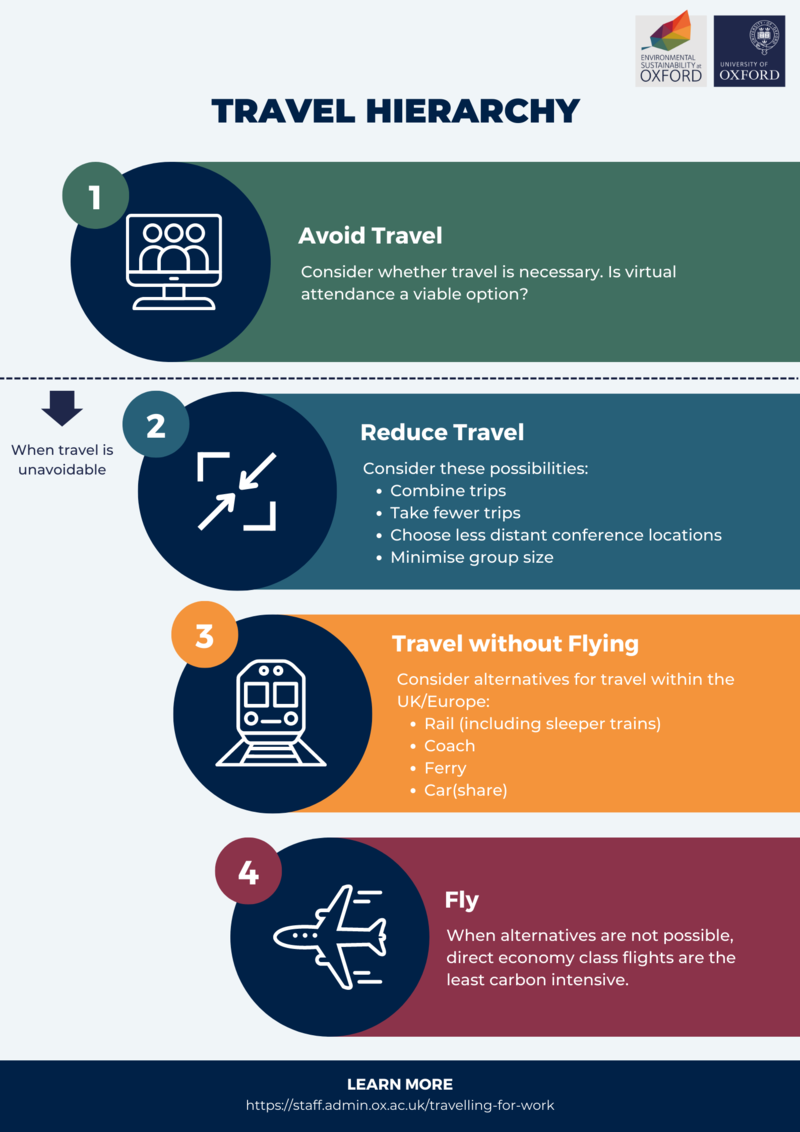How much is the flight levy?
The flight levy is calculated at £30 tCO2e (carbon dioxide equivalent emissions). As an example of this, the carbon emissions of a direct, return economy class flight to New York are 2.23 tCO2e, this would result in levy of £30 x 2.23=£66.90. Estimates of flight levy amounts .These are intended as useful estimates for budgeting.
Why is the levy not charged on rail travel?
The Travel Policy focuses on reducing the highest emitting mode of travel, flying, and promotes rail where possible. The carbon emissions from rail are much lower than flights. For instance, Eurostar emissions for London to Paris are 91% lower than the equivalent flight.
How was the flight levy amount decided on? Why is the flight levy set at £30 tCO2e?
The flight levy was initially proposed to the Environmental Sustainability Subcommittee at three levels of £30/£50/£70 tCO2e. The lowest level was approved to reduce the burden to departments. The flight levy amount will be reviewed every two years, taking into account carbon pricing levels.
Will my department be charged the levy before I have even travelled?
The levy is recharged after booking (not travel), usually 1-3 months after booking. This could be before or after travel.
What happens if my flight is changed or cancelled?
For bookings made through the preferred provider, if any changes are made to the booking, you will not be charged any further flight levy, if the booking is cancelled and the flight levy has already been recharged, it will be reversed by the middle of the month following the cancellation. For cancellations from other bookings you will have to inform us by email (travel@admin.ox.ac.uk) and request a reversal of the flight levy.
I already offset my flights/my departments already offsets our flights, does my department still have to pay the flight levy?
Yes, the flight levy must be paid regardless of any departmental offsetting. Offsetting is not considered a long-term solution to climate change. Our approach is in line with the Oxford Principles of Offsetting which supports prioritising reducing emissions over offsetting to minimise the need for offsets. The Travel Policy’s flight levy will be used to reduce emissions. Offsetting will only be used to fully offset the University’s residual carbon emissions and biodiversity impact from 2034. It is recommended that departmental funds used to offset flights are instead used to pay the flight levy.
Where does the flight levy go to and what will it be used for?
The flight levy is allocated to the Oxford Sustainability Fund and used to implement the Environmental Sustainability Strategy at the University. This includes measures such as improving biodiversity, reducing carbon emissions from our buildings, improving the environmental impact of our supply chain, increasing research and engagement in environmental sustainability, and increasing environmental sustainability content in the curriculum.
Are other Universities charging a flight levy?
Flight levies are being charged at some Universities across the world and more Universities are expected to introduce similar measures.
Will departments have to calculate their own levies?
No, Estates finance will calculate the levy and will recharge the levy.
How much is the levy likely to cost my department?
It is expected that the levy will add approximately 8% to the cost of economy class flights. For departments with high levels of business class flights, this figure may rise to 15%.
What does my department have to do to implement the Travel Policy and the flight levy?
The Departmental checklist
- Inform staff of the Travel Policy and the travel restrictions of no first class travel, no domestic flights for destinations that can be reached in under 7 hours, and using Eurostar for trips to Brussels and Paris.
- If preferred, nominate a separate cost centre for recharging flight levies. If no cost centre is provided the departments’ default cost centre will be used.
- Agree an approval process to approve premium economy and business class flights by Head of Department/their delegate.
What is the methodology for calculating carbon emissions of flights?
The methodology has been defined.
How do I query the flight levy charged to my department?
Departments can raise any flight levy queries by emailing travel@admin.ox.ac.uk.
Will departments have access to information on their flights and flight levies?
At the end of the first year, each department will receive a report on its flights. This will provide departments with comprehensive data on departmental flights.



